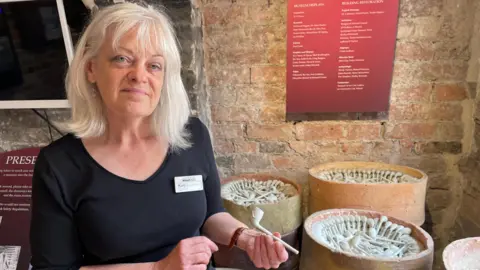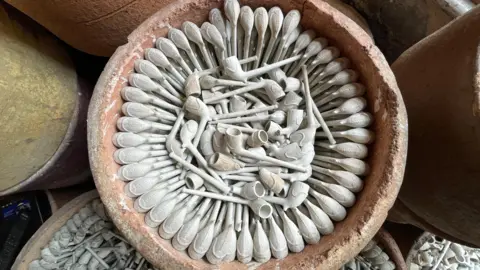Pipeworks museum reopens with donated artefacts
 BBC
BBCA Shropshire pipeworks museum has opened for the season with new artefacts on display for the first time.
Family of the former Broseley Pipeworks factory owners have gifted a large collection of large clay pots known as saggers to the museum.
The saggers contain thousands of unfired pipes thought to have been produced at the facility before it shut in the 1950s.
Curator Kate Cadman said it was a "wonderful" surprise to discover the pipes inside and "remarkable" they had survived.

At one time, Broseley was the centre of the clay tobacco pipe making industry, and its products were exported across the world.
"Broseley has a long history of making clay tobacco pipes, partly because of the local clay and the local coal for firing kilns," Ms Cadman said.
Broseley Pipeworks, originally known as the Crown pipeworks, was one of the last surviving factories and finally abandoned in the late 1950s.
The facility, acquired by the Ironbridge Gorge Museum in 1991, has been preserved to look as it did when the last pipe-makers left.
The Southorn family, which originally owned the Crown workshop, have donated more than 100 saggers to the museum.
"This was a generous gift by the Southorn family that will help us show visitors to the pipeworks the scale of clay pipe production in Broseley," Ms Cadman said.
The museum is also hosting demonstrations by " a new generation" of pipe-makers who are being supported to preserve the traditional craft.
"Pipe-making is on the Heritage Craft Association's red list of endangered skills," Ms Cadman said.
"There are less than half a dozen professional pipe-makers left and most of those are in their 60s or 70s."
Resident pipe-maker James Ashwell is experimenting with 3-D printed plastic moulds, which could enable the remanufacturing of rare originals.
"It will be exciting to see the impact of James's work developing moulds and how this might help encourage new makers," Ms Cadman added.
The museum will open on Thursdays and Saturdays until September.
Follow BBC Shropshire on Facebook, X and Instagram. Send your story ideas to: [email protected]
